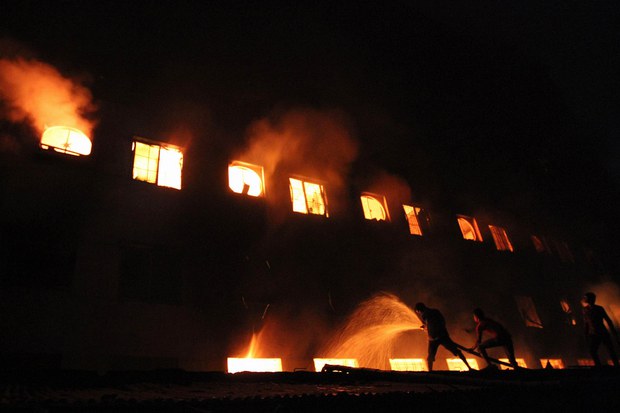Bangladesh: 13 To Be Tried For Deadly Factory Blaze
2015.09.03
 Civilians and firefighters try to put out a fire at the Tazreen Fashion garment factory in Ashulia, a Dhaka suburb, Nov. 24, 2012.
Civilians and firefighters try to put out a fire at the Tazreen Fashion garment factory in Ashulia, a Dhaka suburb, Nov. 24, 2012.
A court in Dhaka on Thursday ordered the two owners of the Tazreen Fashions garment factory to stand trial with 11 others for a fire there that killed 112 workers in Bangladesh’s deadliest industrial fire.
District and Sessions Judge M. Kuddus Zaman set Oct. 1 as the start date in the trial against Delwar Hossain, managing director of the Tuba Group, which owns Tazreen, and his wife Mahmuda Akter Mita, the group’s chairman, according to news reports.
They will be tried alongside 11 other defendants, including plant managers and security guards accused of obstructing workers from trying to escape from the burning factory, when the fire broke out on Nov. 24, 2012.
All 13 defendants are charged with manslaughter and culpable negligence under Sections 304 and 304(a) of Bangladesh’s penal code, and could be sentenced to life in prison if convicted, according to the prosecution. The criminal charges were brought against them in December 2013.
The fire at the factory in Ashula, a Dhaka suburb, was the first of two large-scale disasters to hit Bangladesh’s lucrative garment industry in a span of five months. On April 24, 2013, more than 1,100 workers died in the collapse of the Rana Plaza garment factory complex in nearby Savar.
The twin disasters drew international attention to workplace safety and conditions for workers in Bangladesh, the world’s second largest exporter of ready-made garments after China.
Bangladesh exports ready-made garments to giant global retailers like Wal-Mart, J.C. Penney, The Gap, Primark and others in the United States and Europe. The sector accounts for more than 80 percent of Bangladesh’s total annual exports, valued at nearly U.S. $30 billion.
‘My clients are innocent’
At the Dhaka district courthouse on Thursday, T.M. Akbar, an attorney representing the two owners, pleaded for the judge to dismiss the case against them.
“My clients are innocent. They were not present when the fire started. In fact, Hossain rushed to the scene when he learned about it in order to save the workers,” Prothom Alo, a Bangladeshi daily, quoted Akbar as pleading in court.
“Moreover, none of the 137 witnesses mentioned my clients’ names during hearing. So, I request the court to drop their names from the charge sheet,” he argued.
The state prosecutor counter-argued that the defendants were all culpable as one because the doors in the factory were locked when the fire started, forcing desperate workers to rush out through only one open exit.
The judge rejected the plea and ordered that all 13 defendants be put on trial.
Eight of the defendants, including the two owners, were in the courtroom Thursday. After surrendering to the authorities earlier, all eight were freed on bail. The five other defendants are absconding, and will be tried in absentia.
As for legal proceedings in the Rana Plaza case, on June 1 murder charges were brought against 41 people, including the owner of the complex and 12 government officials, who were responsible for building safety and inspections at the multi-story site that housed five factories.
Owner Sohel Rana, who was arrested days after the collapse, and the 40 other defendants would face the death penalty, if they end up being tried and convicted.
On Tuesday, a court in Dhaka sent Rana’s mother, co-defendant Morzina Begum, to jail after she gave herself up to the authorities.
Reforms underway
A global outcry that followed in the wake of the twin disasters forced international retailers and the Bangladeshi government to take urgent steps toward improving fire prevention and overall safety at the country’s 4,000-odd factories. These employ nearly 4 million workers – 80 percent of whom are women.
Two entities – the Alliance for Bangladesh Worker Safety and the Accord on Fire and Building Safety in Bangladesh – which comprise American and European apparel brands, respectively, were established to supervise reforms in the nation’s garment sector.
Although improvements still are being implemented in many factories, these two groups monitoring the reform program, along with the Bangladesh Garment Manufacturers and Exporters Association (BGMEA) as well as the government, so far have certified that a sizeable number of factories are on track to meet the safety requirements laid down by a joint committee.
In some cases, there has been remarkable progress in putting improvements into place.
On Thursday, Alliance Executive Director James Moriarty – a former U.S. ambassador to Bangladesh – praised the sector’s efforts at a ceremony in Dhaka, where a half-dozen factories received special awards in that regard.
“I can say that the reform of the factories is going ahead as planned. Today, six of the factories have been recognized for achieving international safety standards,” Moriarty told the event.







